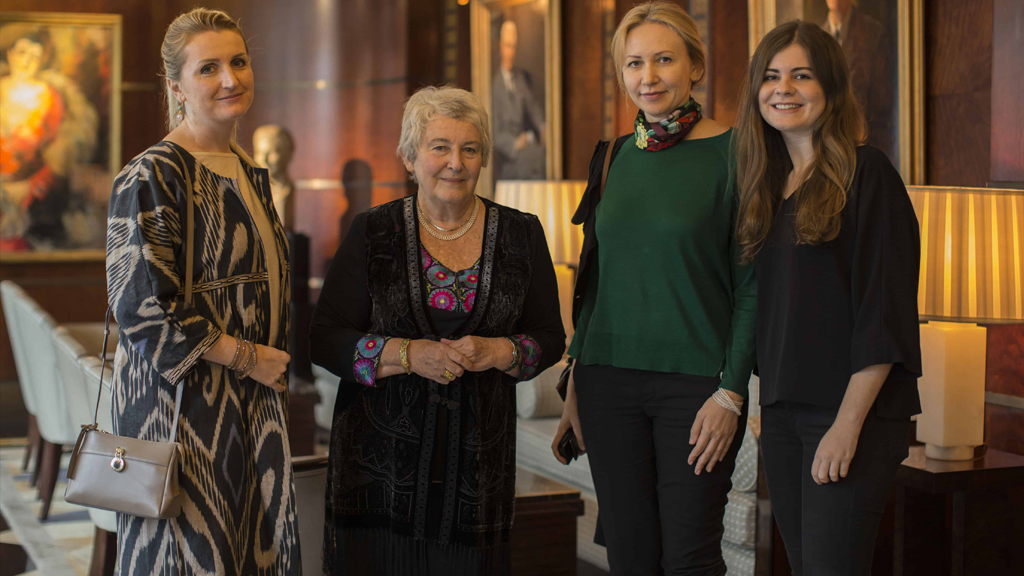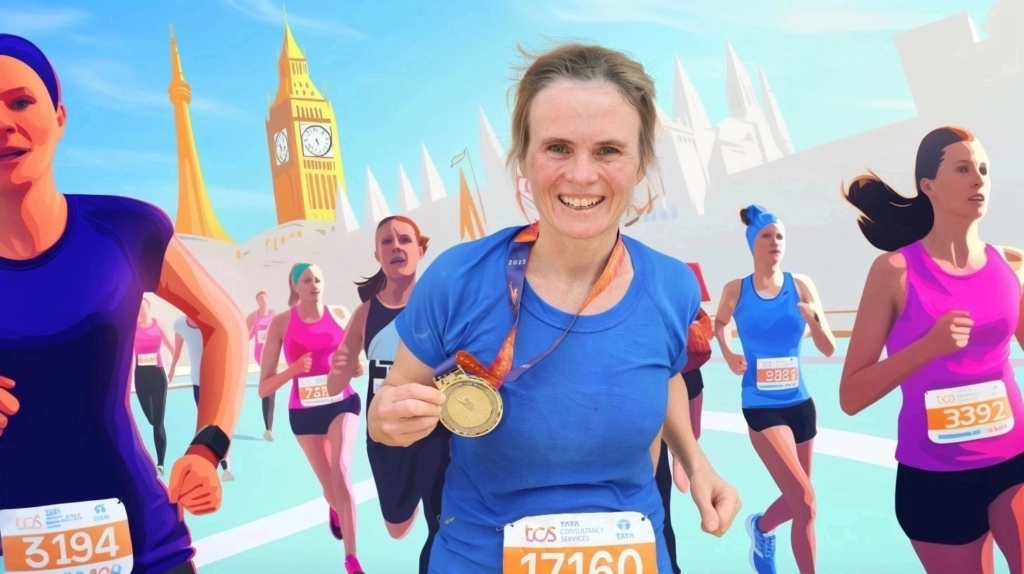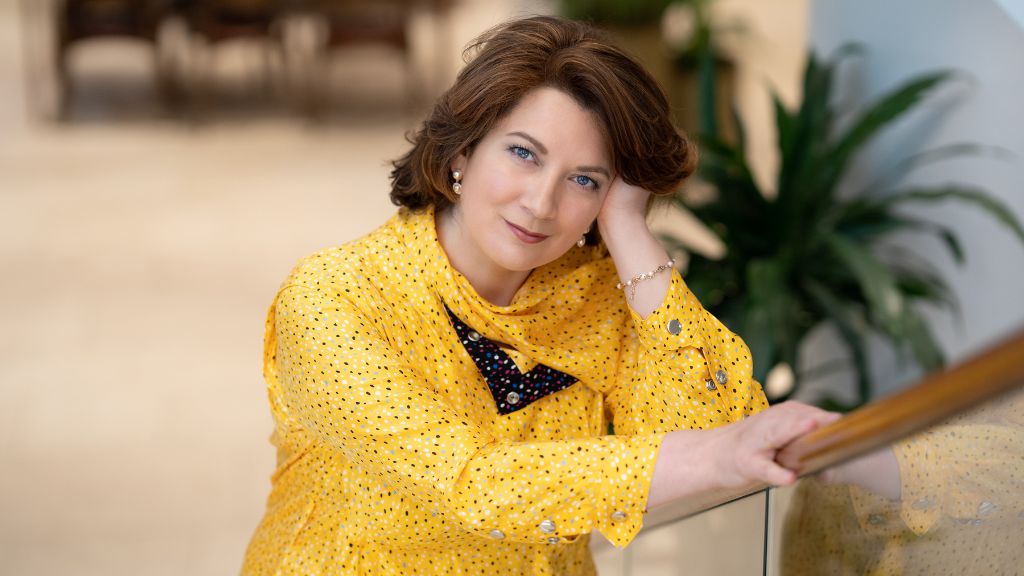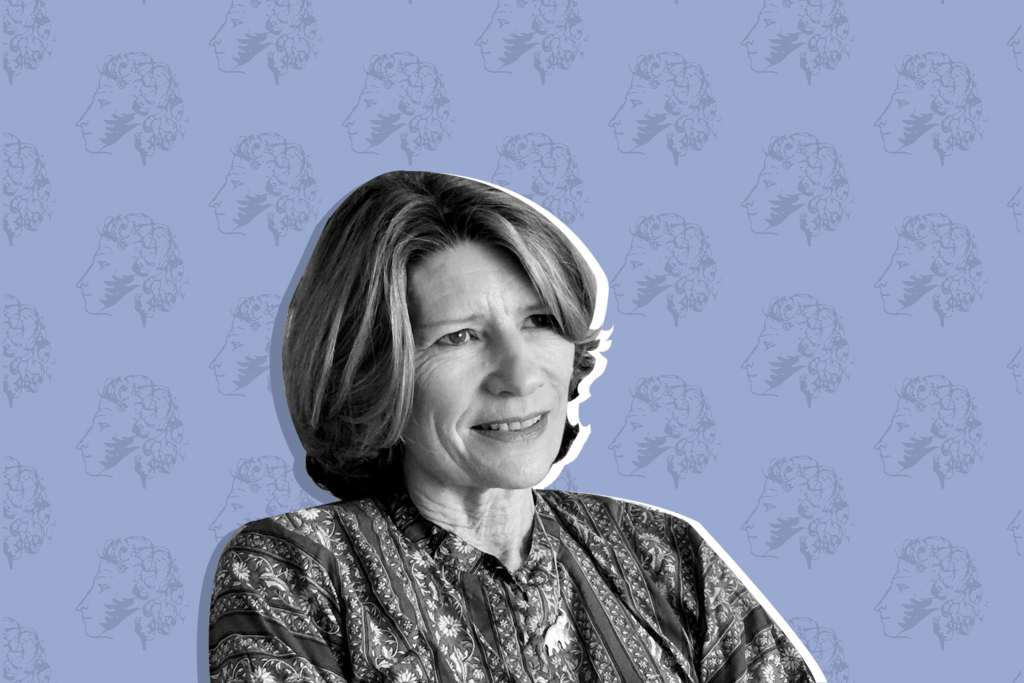
Interview: Marita Phillips and new opera “Pushkin”
The greatest Russian poet and the Tzar. What is the opera key and why it’s worth going?
While waiting impatiently for the premier of «Pushkin» presented by Novaya Opera, RussianEvents.London talked to Marita Phillips – poet`s direct descendant who wrote the libretto.
The Heritage
Marita, you are the great-great-great granddaughter of Pushkin and you are also related to Nicholas the 1st. Can you please tell us what`s the story behind?
Yes, so I`m also great-great-great granddaughter of Nicholas the 1st. Grand Duke Michael Mikhailovich who was the tsar’s grandson met Pushkin’s granddaughter Countess Sophie von Merenberg in the South of France. He fell madly in love with Sophie and decided not to tell his family because they would insist on him leaving her. Instead they just went to San Remo in Italy and got married. Grand Duke Michael’s mother Olga died of a heart attack shortly after she heard about it. That was a big scandal and they never ever were allowed to go back to Russia. They lived in the South of France and then they came and lived in England. That was like a hundred years ago and my family lived in England ever since.
So you have British and Russian roots. And where does your beautiful name come from?
My grandmother was completely Russian. Otherwise we have a lot of foreign blood. I think my name comes from my father who had some Peruvian blood. If I remember rightly it sort of means «little Mary» – it’s a Spanish diminutive. So really lots of international roots and heritage behind.
Pushkin as “our everything”
You are mainly a writer. How did you come up with the decision of writing an opera libretto?
I have always written lyrics for songs (Marita`s songs have been recorded by Art Garfunkel, Peter Skellern, Demis Roussos and William Lovelady) – so it was sort of quite natural. And I worked in the theatre myself, I was a mime (Marita also studied acting at The Guildhall School of Music and Drama and ballet at the Nesta Brooking School before training as a mime with Adam Darius. Later they`ve founded and ran The Mime Centre in London). So being involved in the theatre and writing lyrics I feel that opera is somewhere in between. And Pushkin is such a big subject – I felt its very suited to opera.
You obviously know Pushkin is almost a Saint in Russia. Everyone has its own opinion on him, his literature, his life. Wasn`t it a bit of pressure there?
I can never ever – and I say this often – understand all the feelings about Pushkin like a Russian person. No one can unless he`s Russian. You only can observe it and see it. I find it very moving and very interesting, but I know I can`t ever understand him in that way. But it doesn`t mean you can`t have opinion about him as a person. Because frankly we have our own subjective views on everything. And his life is very well documented – unlike Shakespeare’s for example. There`s such a mass of information that you can get a very good sense of a person and his life. I was just trying to work out what he was actually like.
I feel that Russian people have learned about Pushkin from such a young age, he`s so much part of their lives, he`s like mother`s milk. When I spoke to Russians about him – which I did a lot – I didn`t particularly get psychological information on him if you understand what I mean, which makes it sort of even more interesting. Anyway, for me any genius is bigger than the country he was born in. They write about universal human conditions and feelings and they belong to the world.
I think Pushkin is a wonderful person to write about, because his life was often so difficult – he made it so difficult. He had that complicated relationships with the tsar, he had his personal problems, he had all those situations… So he wasn`t an easy personality, but then most creative people aren`t. I was mesmerized by the contrast – the difficulties of his life and him producing these absolutely beautiful, perfect literature gems.
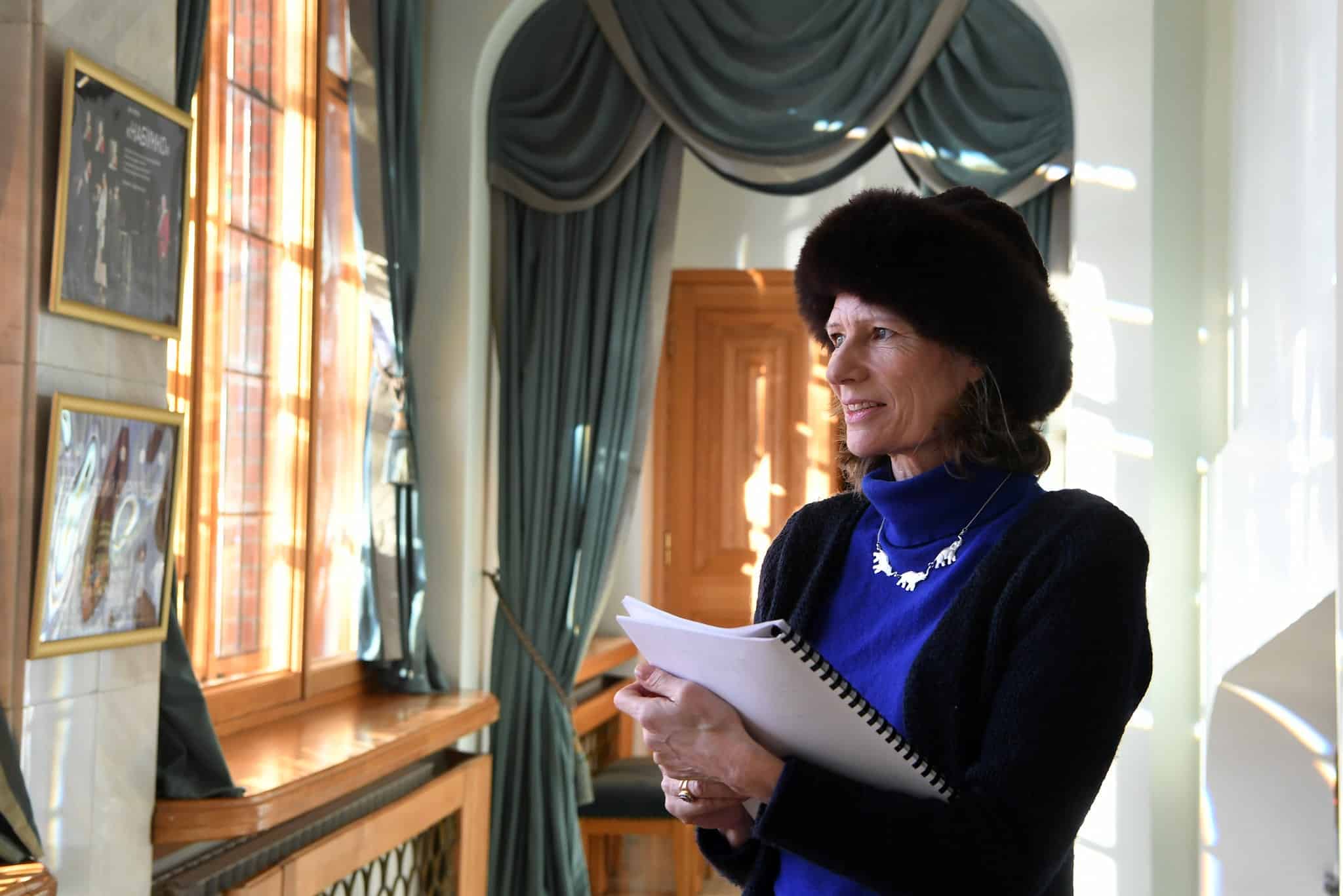
Marita Phillips in Moscow
Poet and Tsar
What is libretto based on? Did you use his biographies, archives, letters? What`s the work behind doing such a huge thing?
There`s so much information, you can get such a sense of a person! But particularly I used his letters. I think what people don`t understand is that there`s such a difference between a biography – which I wouldn`t dream of writing, because you have to know Russian properly and know his works in Russian -and theatre thing. When you are writing something for the theatre you are thinking of the main theme and you use different bits of life to illustrate it. That is what I’ve done. You don`t actually need to get every detail – sometimes you even have to change things for the bigger truth, to make people realize clear enough what you are trying to say. It has to work as a drama. It must have a shape that is dramatic. People`s lives – however interesting – don`t look like a drama.
What is the central theme of the opera and who are the main characters?
The main character is Pushkin and his relationships with the tsar are in the centre. But what also interests me personally are creative people. Wherever they live – in a free world or in dictatorships – their creative integrity is really always tested in some way. And most creative people have very messy life – I think if they didn`t they couldn`t write. People need to express themselves and transform their experiences. For me the very important thing is that Pushkin`s death is not a complete accident, he was having a nervous breakdown at that time and really wanted to die. It was not – “now I’m going to die” – but sort of an unconscious feeling. Understanding of that was very helpful for making the whole thing dramatic.
Flat translations and Russian literature
And do you think Pushkin`s literature is well-known and popular among British people nowadays?
No, I don`t think it is. People have heard about him, but they mostly know of him from the operas, like Onegin or The Queen of Spades for example. It’s a great shame, but I think the main reason is that he`s so difficult to translate. Poetry anyway is not easy to translate. But he is particularly difficult, because of him not using much metaphorical language. I think his translations can seem flat. In English you can see and understand what he could be, but you can`t quite get him. I don`t think it’s the same as to read it in Russian.
Are you personally fond of Russian cultural heritage aside of Pushkin?
I`ve just thought of a book I got my children to read first. It was The Crime and Punishment by Dostoevsky. I think The Crime and Punishment is one of the great books, really extraordinary. And my children – all three of them – were completely blown away by it!
How old were them when you suggested to read it?
They were about eighteen or something. Two of them studied English literature in the university so they were interested in it.
That seems just the right age, in Russia you do at school when you are around 13 years of age and it is so early!
Yes, I think that`s right! It`s like I got my daughter to read Anna Karenina and she hated it because she hated Anna.
Because you need to be more mature to understand the character, right?
Exactly! She was theorist at the time. She would enjoy it now.
“Russians are very emotional”
Marita, what should we expect: is the opera written and staged more in a classical way or is it a contemporary thing?
What I wanted is to make it quite contemporary, I didn`t want 19th century language. Because if Pushkin was here today his language would have been extremely immediate and contemporary, not old-fashioned for sure.
How long is the opera and what language is it sung in?
It is 2 hours, consists of two acts and it is sung in English. The poems by Pushkin are in Russian, but I wrote the whole thing in English.
And how did you meet the composer and chose him of all others?
Well the sort of key person in making all that happen is a conductor – Jan Latham-Koenig. He`s the chief conductor and the head of the artistic board of the NovayaOpera which is quite interesting, because I think he`s the only British person in that position within the Russian opera company. He introduced me to Konstantin Boyarsky (principal violist at London, Royal Opera House) and it was a brilliant choice. He is Russian – and it obviously should have been Russian composer – but then he lived outside Russia since he was 11. He`s free of being protective about Pushkin if that makes sense. But also, because the libretto was already finished it was still easy for him to identify with it, because it was Pushkin. I love the music: it’s very melodic and emotional, some of it is contemporary. I`m very happy with it.
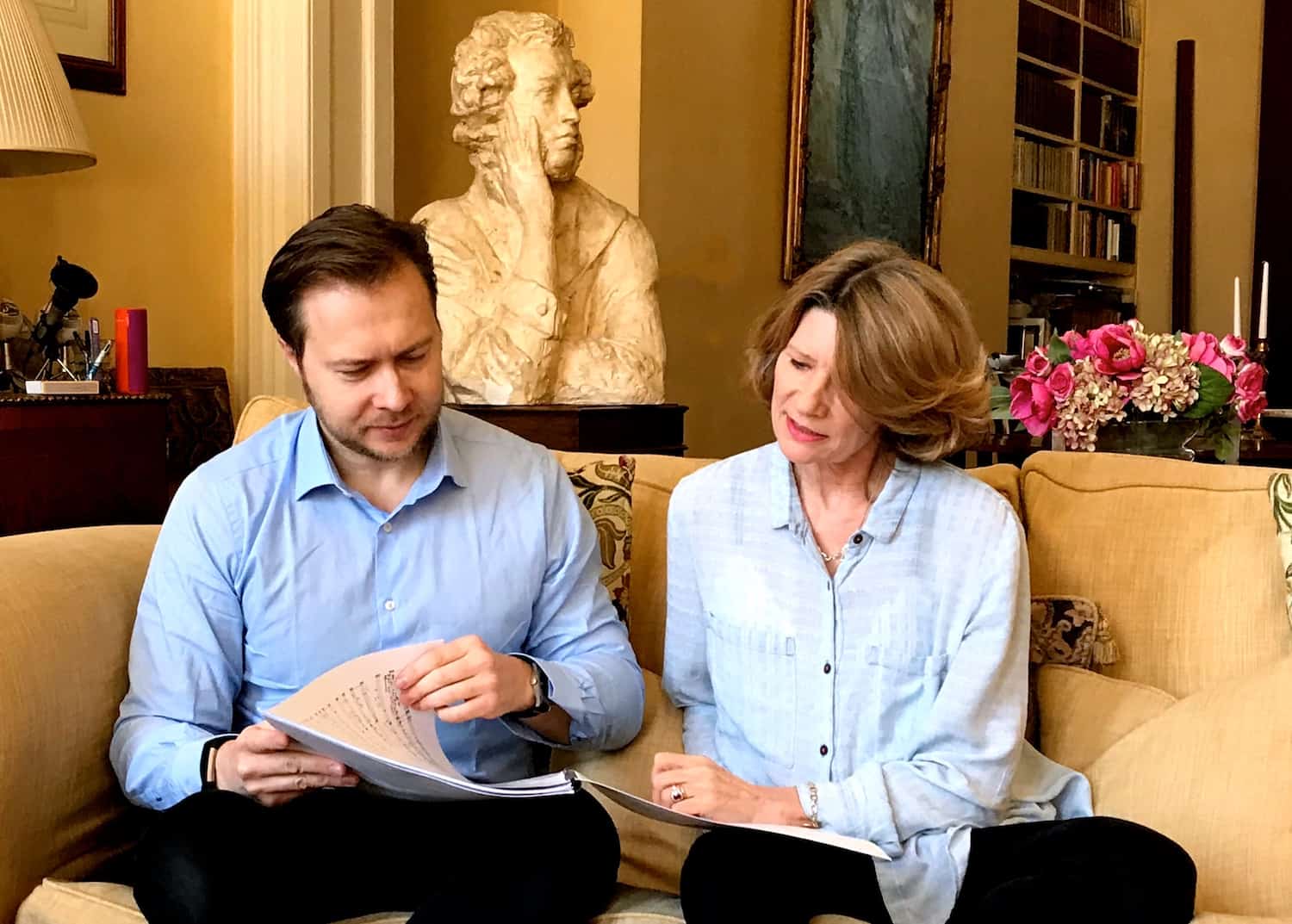
Marita Phillips and Konstantin Boyarsky
Concert version of the opera was shown in Moscow last year. Were you happy with people`s response?
I was very happy with the response, they did react very positively, and I think they loved the music. In Europe we have a lot of modern operas and I might be wrong, but I don`t think that Russians particularly love that. Russians are mostly very emotional. I was surprised how well they`ve responded.
Do you think when performed in Britain it will attract mostly British or Russian audience?
I`m very curious. I don`t know… I mean it will be mainly British because there are obviously more British people there then Russian. But I hope a lot of Russians will come see it as well. And I’m very curious what they will feel about it.
Grab your last tickets to the opera, 11 and 12 July, book here
By Elizaveta Davydova
SUBSCRIBE
Receive our digest once a week with quality Russian events and articles
